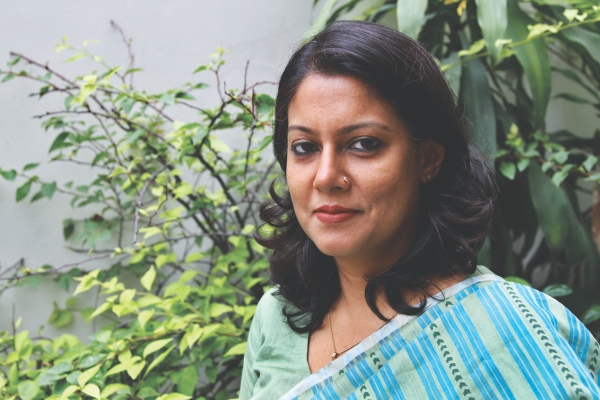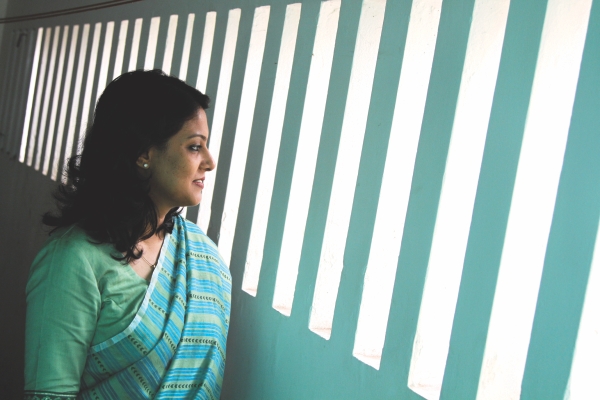Profile

Syeda Rizwana Hasan, Photo: Amirul Rajiv
A Guardian of People's Rights
One of the six winners of what is known as Asia's Nobel, the 'Ramon Magsaysay Award' for 2012, Syeda Rizwana Hasan, chief executive of Bangladesh Environmental Lawyers Association (Bela), shares with the Star, a glimpse of the judicial activism that brought her and Bangladesh this special honour.
Landing in the Legal Lane
I became a lawyer because of my father's interest. He was a lawyer and a politician. Because of politics, he could not practice law, so he encouraged me to study law. At that time Paper Chase was aired on television and I used to find the arguments very exciting. But I never thought of taking a case for a fee from client. From the very beginning, I felt that I would give my service to the poor and the underprivileged. Many lawyers today have a fixed rate. For example, they charge one lakh taka for one hearing. I never found it proper to fix a price for myself. But that is entirely my opinion and I am not saying that it is improper for others. Perhaps it is an art that I could not master.
Beginning with Bela
Starting my career at Bela was not a conscious decision for me. I wanted to work in an organisation where I could carry out research. Bela offered that opportunity. Moreover, after coming to Bela, when I was exposed to environmental laws and came to know about the environmental issues and the existence of so many environmental laws that can address these issues, I was very inspired to stay at Bela and decided to continue my legal practice here and engage myself in legal activism. This helped to work out a way to exercise my reservations toward getting into conventional practice.
In Memory of the Mentor
The person who brought me into environmental activism was my boss Dr Mohiuddin Farooque. He was a great man. Even after his death, most of us — the former employees — stayed behind at Bela. Those who could not stay back and had to leave Bela for practical reasons, are now either working as members, or helping Bela as well-wishers. He was a mentor. He nurtured the ideas of doing something new, innovative and challenging. As a result, when I entered Bela at the young age of 25, that idea of doing something exciting for the society and being surrounded by people, who rely on you to lessen their suffering, created a different feeling inside me. The realisation that I can contribute something to the society had occurred then. Even if I don't join the conventional practice, even if I never have a chamber of my own, even if I am never recognised as a successful corporate or a criminal lawyer, there is a field where I can serve the cause of justice. Farooque bhai had injected this idea into our minds.
The First Fight
I drafted the first legal notice of Bela. During the city corporation election of 1994, the walls of Dhaka were smeared by posters. Meetings and processions continued the whole day. Noise from microphones strained the ears. We had gone to a street in Old Dhaka and saw that the entire alley had become so dark because of posters and banners that one had to enter the alley with a lantern even in broad daylight. I was working then on the first book published by Bela 'Laws Regulating Environment in Bangladesh', where all the environmental laws were compiled. In doing so, I found that there are laws against each of these activities. So I took the initiative of drafting a legal notice myself and left it on my boss's table. Returning to office, I saw that he had written on it 'Excellent! See me.” We sent that (the legal notice) to the then Chief Election Commissioner Justice Md Abdur Rouf and to Dhaka City Corporation. I went to spend the weekend at my in-law's house at Narayanganj, where I received a phone call telling me that Election Commission wanted to do something about the legal notice I had sent. A meeting titled 'Election Campaign: People and Authority Face to Face' was held where the Election Commissioner, representative from City Corporation, Police Commissioner, ordinary people and NGO leaders took part. We raised these issues and they said that they too were annoyed by this (excessive campaigning). They were receiving complaints from many but did not know what to do. Now that they knew, they would take measures against them. We filed the case on January 27 and a rule was issued that for as long as environmental nuisance was not stopped, the election would not be held. Khandoker Mahbubuddin Ahmed was our senior in this case; he argued and the rule was issued. The election was to be held on January 30th. All the political parties became added parties (initially the case was filed against four government bodies responsible for enforcement of various civic rights). IWorried that the High Court would stop the election, they (the political parties) all came and signed a bond confirming that they would stop this nuisance. Then the Court disposed of the case saying that 'environmental hazards have to be mitigated'. That was the first case of Bela.
The Constant Challenges
One personal challenge that I face is media campaign by corporate bodies against me. I also face reluctance amongst media houses. For example, advertisement of unapproved projects cannot be published but almost all media is doing so. While they are strongly supporting my fight against encroachment of water-bodies, at the same time they are also publishing advertisement of projects that fill up water-bodies. Eliminating this reluctance becomes a challenge. It becomes a challenge to bring the government to our side. Verbally, government echoes what we say, but does the opposite. If we could get political commitment from the government, we could progress a lot. Then there are organisational threats warning me not to go too far.
Breathing in the Polluted Air
Frustration does build up. But there is no point in being frustrated about one's own country. If one becomes frustrated about one's country then everything comes to an end there. That can't happen. So at one point the frustration becomes a rage and when someone calls and requests to file a new case, I realise that people have not lost their hope yet. With an achievement like this (Ramon Magsaysay Award 2012), we realise that we are on the right track. We have to continue working. It is only normal that the verdicts won't materialise. Is it possible that government will listen to the Court rulings immediately, given the kind of administrative structure this country follows? Rather we have to give extra effort. Probably, we miss out on that extra effort as we become busy with other issues. Perhaps, neither we nor the government have proactively given enough effort to lessen the distance.
Marching Forward
One of the most important things that we need to do more is convert the political promise of the government into commitment. We have not been able to do this because our opposition is much more organised, financially strong and politically blessed. By opposition I mean vested quarters like housing companies, shrimp farmers, ship breakers and some other industries. Under the circumstances, what political government will take into account is whether public opinion is in favour of this issue. So what we have to do is engage the public in creating an environmental movement in the country. If we could organise those communities where there is environmental havoc or pollution and raise a voice, I think, the democratic government would have taken the issue more seriously. In my opinion, these should be our upcoming activities — moving the community issues forward by taking the community along. So far we have issued legal notice, we haven't mobilised people. 'Mobilise, Resist and Transform' — if we can move forward with this slogan, it feels that we can actually transform the society.
The interview taken by TAMANNA KHAN was condensed and edited.
.......................................................................................................................................

Photo: Amirul Rajiv
Birth: January 15, 1968
Education: Bachelors and Masters degree in law from Dhaka University. Eishenhower Fellowship from United States in 2009.
Career with Bela: Started in 1993 about a year after Bela's formation. Took over as Bela's cheif executive upon the death of Dr Mohiuddin Farooque, Bela's convenor, in 1997.
Awards and Honours:
The Goldman Environmental Prize in 2009.
Dubbed as a Hero of Environment by the American news magazine TIME in 2009.
The Ramon Magsaysay Award in 2012.
High Court orders in response to some milestone public interest litigations of Bela:
Removal of illegal encroachment over the rivers of Dhaka.
Relocation of Hazaribagh Tannery.
Installation of Effluent Treatment Plant (ETP) and other pollution control mechanism in all industrial establishment of Bangladesh by 2010.
Regulation of the ship breaking industry and removing ship breaking yards from coastal areas.
Stopping shrimp farming that destroys agricultural land and forest.
Advertisement of unapproved housing projects cannot be published and land cannot be filled.
About the Award:
The Ramon Magsaysay Award was created in 1957 to commemorate Filipino president Ramon Magsaysay and perpetuate his example of integrity in public service and pragmatic idealism within a democratic society. The award is given in six categories: government service; public service; community leadership; journalism, literature and creative communication arts; peace and international understanding; and emergent leadership. Rizwana is the 11th Bangladeshi to receive this award. The foundation on its website mentions that it recognises Rizwana's 'uncompromising courage and impassioned leadership in a campaign of judicial activism in Bangladesh that affirms that the people's write to a good environment is nothing less than their right to dignity and life.'


